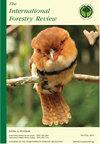中国天然林保护工程:演变、影响与挑战
IF 0.9
4区 农林科学
Q2 FORESTRY
引用次数: 5
摘要
“一刀切”的伐木禁令可能导致与可持续性相关的生态和社会经济问题。伐木禁令将导致木材供应短缺。NFPP中基于自然的解决方案可以对抗森林砍伐和气候变化。天然林的生产力潜力尚未实现。定期更新NFPP是可持续的环境和社会经济发展的必要条件。为了改善环境条件和人民福祉,中国实施了21世纪初世界上最大的生态修复工程之一:天然林保护工程(NFPP)。该计划主要通过禁止伐木来防止森林砍伐和保护天然林。在中央政府的大力资助下,NFPP具有深远的全球生态和社会经济影响。虽然以前的大多数研究都集中在NFPP的积极方面,但也应该研究一些消极方面。最主要的是,NFPP没有充分解决天然林的未开发潜力和这种可持续经济资源的利用问题,应该采用基于自然的解决方案。国家森林保护计划的一些主要政策要点,如森林管理、制度设计、多样化资金来源和全面监测,需要修订。这项研究可以为其他国家解决紧迫的环境问题提供重要的见解。本文章由计算机程序翻译,如有差异,请以英文原文为准。
China's Natural Forest Protection Program: Evolution, Impact and Challenges
HIGHLIGHTS Aone-size-fits-all’ logging ban may lead to ecological and socioeconomic issues related to sustainability. A logging ban will cause timber supply shortages. Nature-based solutions in the NFPP can combat deforestation and climate change. The productivity potential of natural forests has not been realized. Regularly updating the NFPP is a must for sustainable enviro-socio-economic development. SUMMARY In order to improve environmental conditions and the well-being of its population, China has implemented one of the world's largest ecological rehabilitation projects of the early twenty-first century: The Natural Forest Protection Program (NFPP). This program aims to prevent deforestation and conserve natural forests, mainly by banning logging. With heavy central government financing, the NFPP has profound global ecological and socioeconomic impacts. While most previous studies have focused on the positive aspects of the NFPP, some negative aspects should also be examined. Chiefly, the NFPP does not fully address the untapped potential of the natural forest and the uses of this sustainable economic resource, which should be approached using nature-based solutions. Some major policy points in the NFPP, such as forest management, institutional design, diversified funding resources, and comprehensive monitoring, need revision. This study of the NFPP can provide significant insights for other countries addressing urgent environmental issues.
求助全文
通过发布文献求助,成功后即可免费获取论文全文。
去求助
来源期刊

International Forestry Review
农林科学-林学
CiteScore
2.50
自引率
6.20%
发文量
29
审稿时长
>36 weeks
期刊介绍:
The International Forestry Review is a peer-reviewed scholarly journal that publishes original research and review papers on forest policy and science, with an emphasis on issues of transnational significance. It is published four times per year, in March, June, September and December. Special Issues are a regular feature and attract a wide audience. Click here for subscription details.
 求助内容:
求助内容: 应助结果提醒方式:
应助结果提醒方式:


